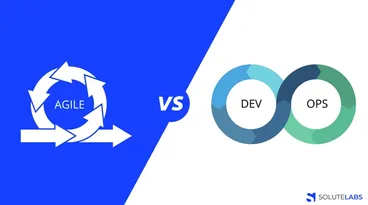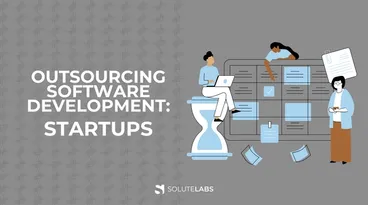Enterprises planning to develop close-knit DevOps and cloud computing strategies can expect it to help accelerate and streamline the development, deployment, and delivery processes of their applications. Such a cohesive approach between cloud and DevOps helps enterprises give their developers better authority over their components and helps accelerate digital transformation.
Cloud and DevOps collaboration helps streamline end-to-end application development and deployment processes with a considerable reduction in human errors.
Using cloud computing and DevOps, enterprises can create self-service methods to help users access agile infrastructure, and help developers innovate, upgrade, and deploy quickly, resulting in achieving digital transformation goals.
According to a research report from Statista, the global cloud computing market size peaked at $83.41 billion in 2022 and is expected to grow at a CAGR of 24% to $376.67 billion by 2029.
Cloud and DevOps – The Game Changers
At a basic level, DevOps helps with the automation of agile methodology. Combining DevOps with the cloud helps enterprises empower their developers to cater to the exact needs of growing businesses in real time. In a nutshell, DevOps helps reduce the latency that’s been plaguing the software industry for quite a while.
Cloud computing can be centralized to enable DevOps automation to test, deploy, and produce on a standard platform. Earlier, with some enterprise systems having distributed nature, it was challenging to fit with centralized software deployment. Whereas, with a cloud platform, distributed complexity issues can be solved easily.
Today, DevOps automation has turned more cloud-centric, with several private and public players supporting DevOps systematically on their cloud platforms. It also makes it easier to use continuous integration and development tools. Such tight integration reduces the associated costs related to on-premises and DevOps automation technology, thus providing centralized governance and control over the process.
Thanks to Cloud and DevOps, enterprises have a reduced need to account for resources leveraged since the cloud leverages user-based accounting to track resource use by application, user, data, and developer. Traditional systems are at a disadvantage as they cannot provide such services. Tracking development resource costs and making suitable adjustments easier by leveraging cloud-based resources.
A point to ponder - Rather than the cloud driving DevOps, it is DevOps that propels the interest and growth of the cloud. According to a state-of-the-cloud report, while DevOps adoption increases by 66%, enterprises clock 71%. Hence it is safe to conclude that cloud computing needs DevOps more than vice versa.
Also, Read: Enterprise DevOps Solutions - How DevOps Works for Enterprise?
How DevOps and Cloud Combine?
What makes DevOps essential for technology to reach the cloud? Enterprise growth has been stifled for too long because of a slow and complicated development process. Several leading players in the industry shun acquiring companies finding it challenging, or unable to launch products due to a huge application development backlog that IT can’t keep up with easily.
Today, enterprises plan to streamline their application development processes by transitioning from waterfall to DevOps, though DevOps alone cannot pull it off. The otherwise agile development process is plagued by the latency in capital purchases of hardware and software. Developers always experience a nail-biting wait for capital resources to be streamlined before deploying applications.
Hence, DevOps without the cloud doesn’t have a value worth talking about. On the other hand, the cloud by itself doesn’t have much value. Enterprises understand how DevOps and the Cloud combine to work wonders since both are interdependent.
How to Approach Cloud Development?
When building applications on the cloud, change must be initiated at the software engineering level and never at the C-level. Industry leaders driving the process realize the advantages of using modern DevOps tools to build cloud applications. People who don’t know the value of such benefits will refuse to hop on board and may even delay the progress.
Enterprises tend to opt for a cloud platform even before they have a DevOps process in place. It is time they realized that both DevOps and cloud computing need to evolve hand-in-hand. Agile processes need to be automated, deploying cloud and non-cloud DevOps automation tools, with due consideration as to how the DevOps processes and automation can be extended to the private or public cloud.
The newness of the DevOps tools and cloud services may pose a challenge to developing a working combination of both. Though the following steps could help:
- Defining your development requirements and prioritizing what needs to be accomplished now, and what can be taken care of later.
- Defining each business case while raising funds and forecasting ROIs with clarity
- As the DevOps process is subject to continuous change and needs to go through reviews, trials, and errors, it is crucial to define the initial DevOps process.
- Before defining the DevOps tools, you must understand the target platforms. Without synergy between the DevOps process, culture, automation, and the target platform it is challenging to determine the “hows” and “whats”. With the new moving parts creating complexity, most enterprises founder and often lose new opportunities the cloud platforms have to offer.
- With DevOps and cloud being new to enterprises, they need to consider their people and ensure their team is on the same page before using DevOps to drive cloud development. Traditional developers fear treading two new paths simultaneously, though they are eager to learn and seek proper guidance. Developers need to be self-taught instead of relying on training to understand modern tools, platforms, processes, and practices.
- Although developers shun operations, there is no other way with the new options. They can no longer hope to toss code and expect the best. DevOps and cloud usher new visibility into the way their applications operate.
It is about time enterprises learned the collective value of how cloud and DevOps bring digital transformation to the industry today. Although unexpected pitfalls and technical hurdles are bound to stifle the growth of businesses, CTOs and technical leads can help tide over them with remarkable alacrity. Enterprises will slowly see the larger canvas depicting the value of DevOps and how it heralds continuous and agile deployment. Though enterprise IT folks don’t understand the concept fully and are afraid of it, they know that adding the cloud to DevOps is the only path to enhancing productivity and application quality.
Cloud computing can only be beneficial for enterprises when strategically combined with DevOps. It is pointless to try to achieve the value of one without the other since DevOps and cloud computing are synergistic in value and function. In order for DevOps to work, you need the correct organization, tools, and a completely new approach. Although traditional methods appear safer, it is time to make bold decisions.
The only thing that makes industry leaders hesitate from making a bold leap is the plethora of changes crucial for DevOps and cloud to work together. Prior to implementing DevOps, you must understand the cloud thoroughly, and the trick lies in synchronizing it with DevOps.
Also, read: AWS vs Azure vs Google Cloud
There is NO NEED to shun the Changes
It would do well for industry leaders and developers to change their ideas about DevOps and realize that it is essential to drive cloud development for a brighter future. There’s no denying the fact that it costs a bomb to implement such changes, and one can’t expect the ROI to be in their favor soon. Alternatively, sticking to the traditional approaches, in other words doing nothing about DevOps and the cloud can only lead to disastrous failure. The worst part is your competitors may not think like you and may take advantage and keep ahead of you. Hence, using cloud and DevOps to accelerate digital transformation will be a smart move that will yield results – ultimately. The market rewards the pioneers and risk-takers. It is never too late, and the best time to test how DevOps and the cloud combine is now.
SoluteLabs takes pride in being able to successfully deliver innovative and strategic projects that require expertise in Cloud Professional Services and DevOps services. We are excited about taking on your next digital transformation project - one that requires a well-rounded understanding of both Cloud Computing technologies and Development Operations processes.
Share your idea with us, and our team of experts will help you achieve your desired results.
Frequently Asked Questions
Have a product idea?
Talk to our experts to see how you can turn it
into an engaging, sustainable digital product.





